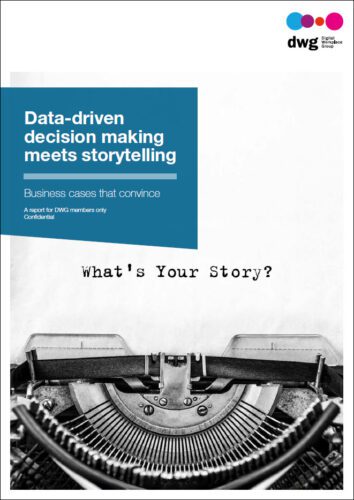Why you can’t manage knowledge – and what to do instead
By Ilana Botha

Workers are drowning in information. The sheer volume of content created in an average workplace is staggering. In 2021, 2.5 quintillion bytes of data were created every day.
Workers struggle to identify the knowledge and information they need for their jobs – spending nearly four hours a day searching. The effort is making them feel stressed and anxious. And it is costing businesses a lot of money – $900 billion according to one study.
Knowledge is like water in a river
Organizations are taking different approaches to managing this proliferation of content – including hiring Knowledge Managers. But as the volume of data and information increases, it becomes more unwieldy. Knowledge is like the water in a flowing river: it is living, evolving and expanding. It cannot be neatly categorized and controlled.
Managing knowledge implies imposing rigid structures and predefined categories; all of which hinders the ability to adapt to emerging trends and changing business needs. It falls short of capturing the dynamic nature of knowledge.
Instead of thinking about managing knowledge, organizations should consider curating it. Curation involves ongoing cultivation, discovery and enrichment of knowledge.
Knowledge curation is less focused on finding more content than ensuring existing content is the ‘right content’. Curation emphasizes the relevance, utility, value, accuracy and currency of knowledge.
The knowledge curator reconstructs content to create new knowledge. Good curators are able to make unlikely connections – between seemingly unrelated topics, between the new with the old, or between different ideas. Curation provides context and meaning to content. Knowledge curation is sense-making.
Asynchronous communication – where knowledge hides
Asynchronous communication tools, such as Slack and Teams, are the mainstays of the digital workplace. Pre-COVID, they were mostly used in remote and digitally savvy organizations. But since COVID, these tools have become indispensable. A multitude of asynchronous conversations are taking place in every organization.
And among these conversations lie golden nuggets of knowledge. Often, tacit knowledge is made explicit via these channels. Among this waterfall of unstructured content lies hidden knowledge. Knowledge that can be extracted via curation and shared with those who need it.
But surely AI can do this?
The rise of AI models might lead us to believe that knowledge can be solely managed by automated systems. Yet, human curation plays a vital role in harnessing the power of knowledge in the digital workplace.
Indeed, AI tools have a role in the modern digital workplace, not least in supporting knowledge curation. Microsoft’s Viva Topics, for example, discovers, organizes and surfaces content, and presents it to those who need it, when they need it.
But knowledge will always need human curation. AI-powered curation cannot (yet) replace human judgment and expertise. Or ensure that curated content matches an organization’s values and strategic objectives. Curation requires developing context and meaning – which AI cannot provide. Machines cannot curate on their own.
Consider a software development company curating knowledge of programming languages. AI models can provide a comprehensive list of programming languages and their features. But human curators play a vital role in assessing the suitability of each language for specific use cases. Humans understand the nuances of syntax and performance, and curate resources. These resources guide developers in selecting the most appropriate language for their projects.
Knowledge curation involves serendipitous discovery. That is, the ability to stumble upon unexpected insights or connections while navigating through information. AI models excel at providing precise search results based on predefined parameters. But they cannot generate novel associations or make intuitive leaps. Human curators bring their creative thinking and exploratory mindset. They connect seemingly unrelated dots and unearth valuable knowledge.
AI models and algorithms can assist in organizing vast amounts of data. But they lack the human ability to understand context, interpret nuances and assess relevance. Curated knowledge must be meaningful, contextual and tailored to specific needs. Human curators filter, validate and contextualize information, ensuring that curated knowledge remains valuable.
Curated knowledge must be reliable and of high quality. Consider a scenario in a healthcare organization where a knowledge repository is being developed for medical professionals. While AI models can provide access to a vast amount of medical research papers and clinical guidelines, it is the human curator who can validate the accuracy and credibility of the information. Through critical thinking, curators can identify outdated studies, evaluate conflicting research findings and ensure that only evidence-based and peer-reviewed knowledge is included in the curated repository. This human-curated knowledge equips healthcare professionals with reliable and up-to-date information to make informed decisions.
Knowledge curation involves ethical considerations such as privacy, data protection and bias mitigation. While AI models can be trained to minimize bias, human curators bring a moral compass and ethical judgment. The curator must navigate sensitive topics, test the ethical implications of information, and ensure inclusivity and fairness. They can also apply safeguards to protect confidential or sensitive data, adhering to legal and regulatory requirements.
So, why can’t we manage knowledge?
In the digital workplace, knowledge cannot be ‘managed’. But it can be curated to create meaning, value and context. While AI models excel in handling vast amounts of data, human curation remains indispensable.
By thinking about knowledge as fluid and evolving, organizations can focus on curating it rather than attempting to manage it. This will allow them to harness the collective wisdom of their workforce in the ever-evolving digital landscape.
Talk to us about…

… becoming a DWG member
Categorised in: Blog, Knowledge management
